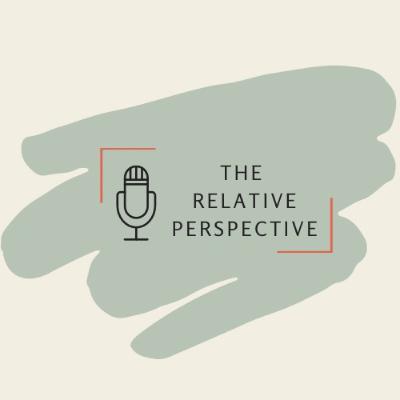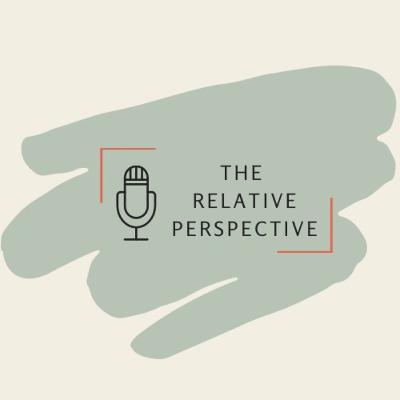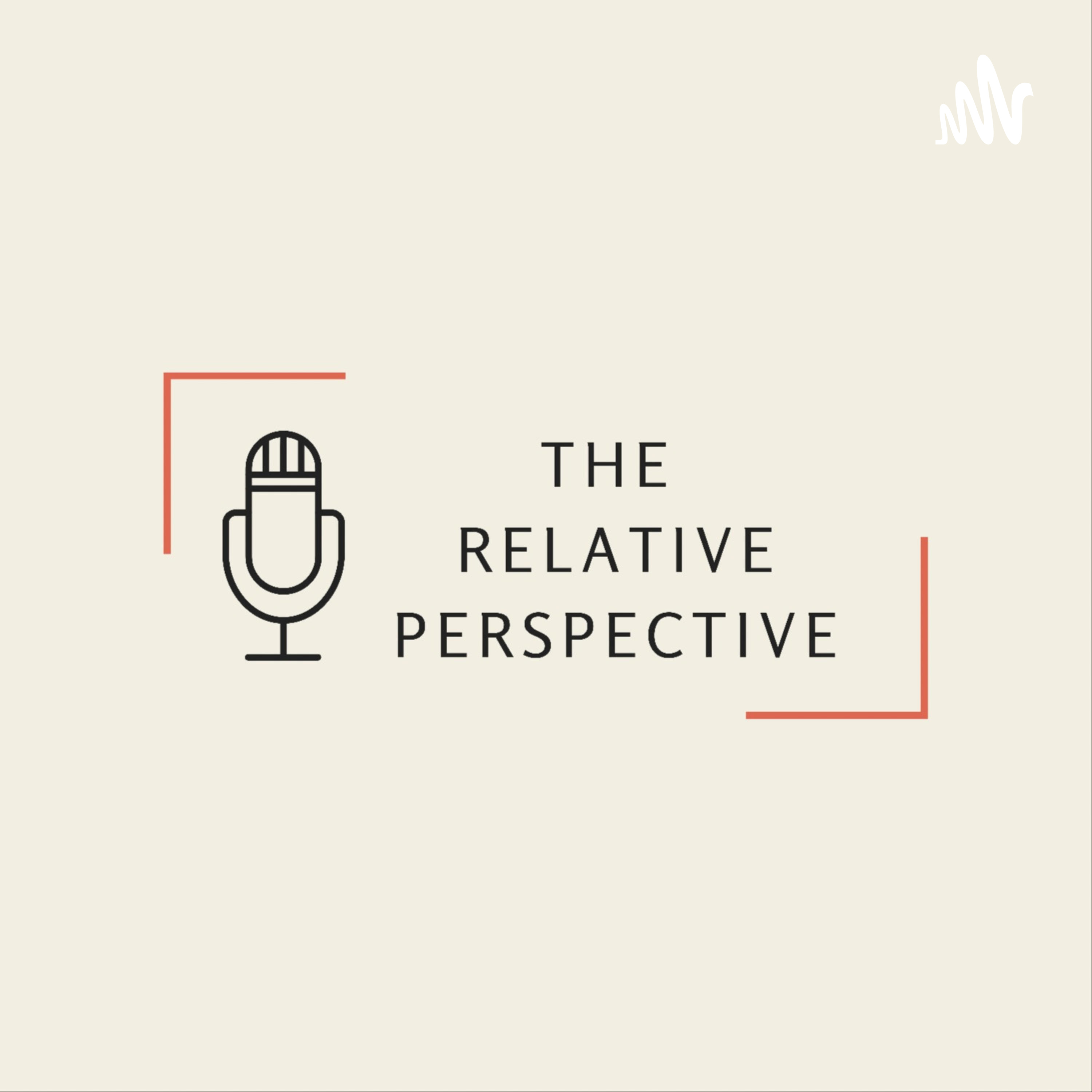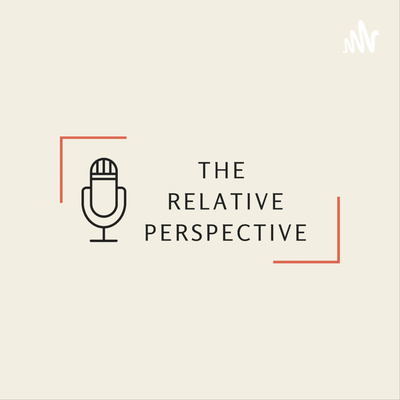Discover The Relative Perspective
The Relative Perspective

The Relative Perspective
Author: therelativeperspectivepodcast
Subscribed: 5Played: 1Subscribe
Share
© therelativeperspectivepodcast
Description
This podcast was born out of my pandemic experience and the belief that there is always something to learn by listening to someone else's story.
My story isn't special, it's simply the case that in 2020/2021, I felt angry, frustrated, resentful, trapped and unheard so in an attempt to articulate and reconcile those feelings, I decided to share the impact of the pandemic on my life and health via a podcast.
Fast forward to now and a bit of 'processing' later, it's time for a new topic of conversation and, with the world as it is now, I can think of no better focus than 'Happiness'.
My story isn't special, it's simply the case that in 2020/2021, I felt angry, frustrated, resentful, trapped and unheard so in an attempt to articulate and reconcile those feelings, I decided to share the impact of the pandemic on my life and health via a podcast.
Fast forward to now and a bit of 'processing' later, it's time for a new topic of conversation and, with the world as it is now, I can think of no better focus than 'Happiness'.
29 Episodes
Reverse
This episode does what it says on the tin; it is a description of my year to date and a feeble justification for my radio/podcast silence. I hope you enjoy this episode and look forward to being back to talk about happiness again very soon.
Happy New Year - but not a new season.
I’m back to finish season 3 of The Relative Perspective which means I’m still on my hunt for happiness.
This episode is about the concept of Hygge which is the feeling of contentment, togetherness, safety, and warmth. A concept not about having stuff, but rather, having connections and experiencing a sense of peace and coziness.
It sounds great doesn’t it. Especially this time of year - Hygge and hibernation are the order of the day. But how do we achieve it?
To answer this question, I’m going to be sharing the best bits of Meik Weiking’s beautiful work, ‘The Little Book of hygge’.
This month's episode is an acknowledgement and celebration of me buying a house. I promise it's not that self indulgent! Rather, as I move in, decorate, and settle into living alone again, I wanted to explore the question 'what makes a house a home?' and also look at whether our homes impact our happiness. To that end, I read (and listened to) Meik Wiking's book 'My Hygge Home' and I want to share some of my favourite takeaways from his research and analysis. It's an amazing, beautiful and informative book and I feel like I have more hygge just by it being in the house.
Welcome back to another episode of The Relative Perspective.
The research I have done to date (in season 3) shows that relationships are the key to happiness; the quantity and quality of those relationships is critical to our wellbeing.
However, my relationships (with friends) are changing for various reasons as we all move through life. I’m not in a romantic relationship and I don’t feel like I have a tribe. To that end, I worry that happiness is out of my reach. In other words, how can I be happy if I don’t have relationships?
That’s where Paul Dolan’s book comes in; Happiness by Design. Dolan sets out the school of thought that in order to be happy, we must do things that bring us pleasure and purpose and allocate our time and attention to those activities.
I also share Dr Arlene Unger’s book ‘Happy’ in this episode because compliment’s Dolan’s work in so many ways. I especially enjoyed her practical tips to train your mind towards a more joyful outlook on life. As such, I end this episode by sharing with you three of her fifty happiness habits to help you build happiness into your day and your life.
I'm back to talk about another book I've read about happiness. This month's episode is based on 'The Joy of Small Things' by Hannah Parkinson. It's an easy read filled with all those little details that we encounter on a daily basis but rarely put into words. In a world where the news is bleak, our time is precious and our money is being stretched, it's reassuring to know that we don't have to go far or look hard for pockets of happiness all around us. It is important for us to remember that, even when it doesn't seem like it, there is happiness to be found in our lives right now. We should take the time to enjoy what we have and Hannah Parkinson offers 109 suggestions for just that.
I’m early with this month’s episode to the point that I think I’ve forgotten something. The fact that the episode is less than 40 minutes in length is also worrying.
I say that because I’m just not sure 40 minutes does this book, or this topic justice.
That aside, this month I read ‘How to be Sad’ by Helen Russell, well I listened to it (twice) on audiobook.
This is a book about sadness, specifically the importance of being sad. Helen explores how staring into sadness allows us to address negative emotions and feel them in a more managed way so that we are not consumed by sadness, but comforted and motivated by it.
Helen writes that there are ways to be good-sad and by addressing sadness and finding a way through it, we are happier for it.
To that end, this podcast is a summary of Helen’s book with some of my experiences and feelings thrown in for good measure (in and outside the context of covid). The episode concludes with ways to be sad and tools which will help you through your sadness.
Whilst I am not an advocate of wallowing, I recognise that the lows in life give you perspective when it comes to the highs of happiness so I hope this episode encourages you to take steps to face your feelings and share your sadness in your own personal hunt for happiness.
Please note, that despite the title, you can be sad in all other months and not just February.
https://www.helenrussell.co.ukhttps://www.helenrussell.co.uk
Welcome back to The Relative Perspective and a belated Happy New Year!
This episode is short and sweet and seeks to introduce this year's theme of 'HAPPINESS'.
All the episodes this season will explore the science behind and the topic of happiness through a blend of book reviews, on location recordings, conversations and experiences (you name it, I'll try it).
My aim and hope is to learn about what makes people (and me) happy so that I can make better choices about how I should invest my time and money (i.e. doing things that bring me joy).
I'm going to share my findings with you and encourage you to make little changes that can have a huge impact on your happiness and in turn, your health.
This month’s episode is a look at (and commentary on) dental services in the UK; think of it as a scale and polish rather than a root canal procedure.
I had terrible trouble with my teeth during the pandemic. I couldn’t get the help I needed and so decay became worse, as did the pain. The result was injections, teeth extractions, hours in the chair for treatment including a root canal procedure, drillings, fillings, expensive X-rays and everything else that goes with it.
I was advised to try DIY filling kits, was on very strong medication to deal with the pain and I felt like I was losing my smile - all because dental services were inaccessible at the time I needed them the most.
In short, the pandemic laid bare just how bad NHS dental services are (not the care or practitioners, but the access and cost) and the state of the nation's teeth.
Thankfully, I was treated through the NHS and by paying privately and, though it was a long and arduous process, I currently don't have any issues with my teeth.
However, not everyone is so lucky. Millions of people are on waiting lists even just to see a dentist and so many individuals have resorted to draconian DIY dentistry such as pulling their own teeth with pliers to relieve their agony.
NHS dentists cannot take anymore patients onto their lists and it’s not economically viable for them to do so (or even keep treating patients on NHS rates). We simply cannot carry on like this.
Dental health is indicative of the rest of our health as well as the affluence of an area, but it’s not just people on the fringes of society that struggle - think about service men and women who leave the armed forces. They go from having an army or naval dentist etc to treat them when needed to having no one. They end up at the bottom of a multiple year long waiting list, waiting for a gap (pun intended).
This is just one episode full of my ramblings on the subject but I’ve done something research on this and want to point you in the direction of the pilot episode of Unreported Britain as well as the Northern Agenda.
As ever, there are thousands of relevant podcasts on this topic and lost of things to read, so I hope this episode encourages you to look into this area in more detail, even retrain as a dentist or maybe just makes you feel a little bit more heard if you had the same issues as me.
This month’s episode is all about sleep. Sleep is a fundamental pillar to good health - we all know what we are like and how we behave when we haven’t had good night’s sleep and similarly, we feel like we can take on the world when we are well rested. In this episode I talk about the impact of the pandemic on sleep, the importance of good sleep and offer some tips and tricks to help you head off to slumberland. As ever, I hope you find this episode interesting and I hope that it encourages you to assess your sleep health/hygiene. I’m not a great sleeper, so I recognise that good sleep/falling asleep quickly can elude many people. If you’re struggling with your sleep at the moment (and my voice doesn’t help you drift off), please be assured, there are millions of ASMR videos, thousands of sleep sound playlists available and hundreds of apps to help. As well as speaking to your doctor, your workplace may invest in subscriptions to meditation/relaxation apps as part of their EAP/wellbeing offerings because they recognise the importance of sleep and the relationship between rest of productivity. You may want to explore these tools because sleep helps us perform better, show up for ourselves (and in our relationships) and has huge health benefits.
It's August, the height of the summer holidays. I've not really had a substantive break from work or the other demands on my time but I've been busy with wholesome things like catching up with friends, mini breaks and a wedding. I've made time for exercise too because it's a huge part of my (daily) routine and this episode is a collection of me exercising throughout the month in various locations. There are three things I hope you take away from this episode: first, exercise shouldn't be a punishment (i.e. if I run for an hour I can have an ice cream guilt free), second, there are so many forms of exercise and there is bound to be something out there for you whether that’s by yourself, with a friend or in a team and third, I hope you're listening to this episode on the move or that it has inspired you/encouraged you to make a move and do some exercise because there was a time (very recently) when freedom to exercise and be out and about was a luxury and it's really important that we are aware of the opportunities for exercise and the adventures it can bring.
Welcome to July's episode of The Relative Perspective. This month I'm talking about exercise. I am passionate about movement; whether it's running, swimming, walking or yoga, I believe that exercise is the best tool we have out our disposal to improve our health (physical and mental). In this episode I talk to you about my journey with exercise, the role it plays in my life and finding the form that I love. I touch on the impact of the pandemic on exercise and conclude the episode by highlighting some of the benefits of exercise - spoiler alert, the benefits are innumerable, life changing and maybe even life lengthening! If you want more information before my next episode check out 'New Scientist - Essential Guide No. 16 Exercise' and the following podcasts - better yet, check them out whilst you move (or groove): The Rich Roll - Built to Move, Stompcast by Dr Alex George, The Run Pod, Joint Approach (The Physio Podcast) and last but by no means least, The Food Medic.
This episode of The Relative Perspective doubles as the launch of The Not So Shoddy Boddy Poddy - This is our brand new podcast which aims to bring to you the latest in all things female, body positivity, body image, and all of life's problems, particularly geared at those in their early thirties (and the weird place that lands us in). Every 4th Friday, we're going to talk about everything from complex trauma to life experiences and have a good laugh along the way! There will be trigger warnings for the sensitive content, so please adhere to the warnings if you are a vulnerable listener. We want to bring you a fun, no holds barred look at current topics, and life as two young headstrong females trying to stear our way through life. As always we encourage inclusive listening and want our listeners to know this is a safe space full of support, fun, friendship and inclusivity. Enjoy The Not So Shoddy Boddy Poddy with Kim & Charlotte... don't forget to contact us via socials with your feedback! https://www.youngminds.org.uk/young-person/coping-with-life/body-image/ https://andysmanclub.co.uk https://www.berealcampaign.co.uk (thank you also to fsm-team and their music 'friends-forever' and soulProd Music for the use of their track 'upbeat-happy-logo-2-versions-146604' for our out-tro!
#therelativeperspective #thenotsoshoddybodypoddy #selfworth #girltalk #bodypositivity #bodyimage #podcast #thirties #flirtythirties #dirtythirties
I’ve been somewhat inundated with emails this week about Mental Health Awareness Week and I’ve seen so many posts on social media (including professional networks) about mental health that I really couldn’t let this week pass without making a contribution myself.
Therefore, off on a tangent to what I initially planned, this month’s podcast is about mental health. As ever, there is an update from me (about me) and in this episode, I share my mental health experiences, before, during and after the pandemic. I apologise in advance for the length of the episode. As ever, I have a lot to say!
With 47.6 million posts about mental health on Instagram and 21.1 million posts with the tag ‘mentalhealthawareness’, this episode barely scratches the surface and so it won’t be the last episode I do about this topic.
If you are worried about listening to this episode or you find discussion about mental health triggering, please take steps to protect yourself and perhaps skip May’s episode. I hope you can access the mental health services and treatments you deserve and need and hope these links help: https://www.mind.org.uk, https://www.nhs.uk/every-mind-matters/coronavirus/, https://www.mind.org.uk/coronavirus-we-are-here-for-you/coronavirus-research/, https://www.gov.uk/government/publications/covid-19-mental-health-and-wellbeing-surveillance-report, https://www.local.gov.uk/public-mental-health-and-wellbeing-and-covid-19, https://bmjopen.bmj.com/content/10/9/e040620, https://www.bmj.com/content/380/bmj-2022-074224/rr-2, https://www.mentalhealth.org.uk, https://www.samaritans.org and https://www.priorygroup.com/mental-health.
Food glorious food! Welcome to April's episode of The Relative Perspective which broadly covers the topic of diets and food. There is so much information about diets and the way food can support health and equally, a lot of mis-information. This episode isn't a consolidation of such information, rather it's an overview of my experience and relationship with food (pre, during and post pandemic), a brief discussion about exciting medical research in this area and some recommendations for other podcasts, professionals and recipes.
As part of my preparations for this episode, I researched the terms 'weight loss' or 'diets' which, unsurprisingly, generated a lot of (sometimes commercialised) support from household diet plan names such as Weight Watchers or Slimming World as well as various different weight loss methods such as 5:2 and intermittent fasting. I find it fascinating that diets are often associated with restriction and calorie deficit (followed by weight loss) but its so much more than that; the diet concept is really anything that you consume (be it good or bad).
I hope you enjoy this episode; more than anything, it made me realise how little I know about diet and nutrition! But never fear, I love learning and here's a list of people who can help and who know tonnes about this topic! I've also included some other useful links: https://www.thefoodmedic.co.uk, https://drchatterjee.com, https://www.jamessmithacademy.com, https://www.instagram.com/diren.kartal/?hl=en, https://www.hsph.harvard.edu/nutritionsource/microbiome/, https://www.ncbi.nlm.nih.gov/pmc/articles/PMC4566439/, https://www.theguardian.com/society/2021/jul/11/unlocking-the-gut-microbiome-and-its-massive-significance-to-our-health, https://www.beateatingdisorders.org.uk/get-information-and-support/get-help-for-myself/i-need-support-now/helplines/ and https://www.eatingdisorderhope.com.
Welcome to Episode 3 of Season 2; this episode is an introduction to a mini series I'll be doing throughout April and May all about diet, exercise and weight. Whilst I won't be giving you any facts or figures about my figure and I won't be journalling my weight loss story through this podcast, I do want to share my thoughts on these topics and my experiences pre, during and post pandemic. I hope you enjoy these next few episodes and you feel you can relate to my story. Some people may find these topics triggering and my heart goes out to you if you struggle with an eating disorder or body confidence. Here's some links I hope help (if you need them): https://www.nhs.uk/mental-health/feelings-symptoms-behaviours/behaviours/eating-disorders/overview/, https://www.talk-ed.org.uk and https://www.beateatingdisorders.org.uk.
Just in time! February's episode is a book review of Adam Kay's latest book, Undoctored. It's a gentle introduction into the main theme of this season, health. I'm a huge fan of Adam Kay and this book did not disappoint; it chronicles his life after leaving medicine and his 'present day' stories are punctuated with flashbacks of his time as a student and as a practicing junior doctor. My thoughts on this book do not do it justice so I'll simply say this - Please pick it up because I couldn't put it down.
Adam discusses a number of topics in his latest book which some people may find triggering - he shares his deeply personal experiences of eating disorders and mental health issues to miscarriage and sexual assault and violence. I touch on these topics as part of my review so it's only right that I make you aware of them from the outset and point you in the direction of the following sites which you may find helpful if you're struggling with any of these things: https://www.sarsas.org.uk, https://www.talk-ed.org.uk, https://www.samaritans.org, https://www.tommys.org and https://www.mind.org.uk/donate/?gclid=EAIaIQobChMI9r-U55y5_QIVGIbtCh0tjAwQEAAYASAAEgKkofD_BwE.
It's January 2023 and The Relative Perspective is back (just in time) with a new format and focus.
This season's theme is health and whilst episode 1 is just an introduction to season 2 and a catch up, I cannot wait to share my perspective with you over the course of this year on all things health and wellbeing.
It's great to be back - I hope you enjoy this episode. If you do, please leave a review and share it with your nearest and dearest (maybe even share it with people you don't like - the more the merrier!).
Welcome back to another episode of The Relative Perspective - two episodes in as many days! I've had a couple of bumps in the road in the last month or two - a bump in my car and a bump to my knee and that is what this episode is about. Well actually, this is another 'catch up' and I use this episode to try and process the (little) things that have been building up and eating me up. I'm not sure how useful this episode is to me or anyone else save that it serves as a reminder that 'I feel how I feel'. The main conclusion is that I absolutely need to get a grip of myself and to that end, this is the end of season 1 and I'll be back soon with a new season.
Welcome back to The Relative Perspective - thank you so much for returning and listening to this new episode. I'm mindful that it's been a while and that this episode isn't about anything in particular except to say that I started this podcast because during the pandemic I experienced frustrations I had never had to navigate before and I didn't have an outlet to deal with those feelings and it turns out, I feel the same all over again for different reasons. Despite having no restrictions, living back in the Lake District and, on balance, things generally being okay, I feel very 'meh'. In this episode, I return to the microphone and try to express how I'm feeling (burned out and miserable) and ask you to consider: do you feel flat too?
This is episode 6 of the Relative Perspective Podcast. In this episode I talk about my in-laws, well, I talk about my path to law and my legal career to date. I also discuss the impact of the pandemic on my working life, in particular, the requirement to work from home. Thank you so much for listening; I hope you enjoy this episode and, if you do, please get in touch or leave a (good) review!








